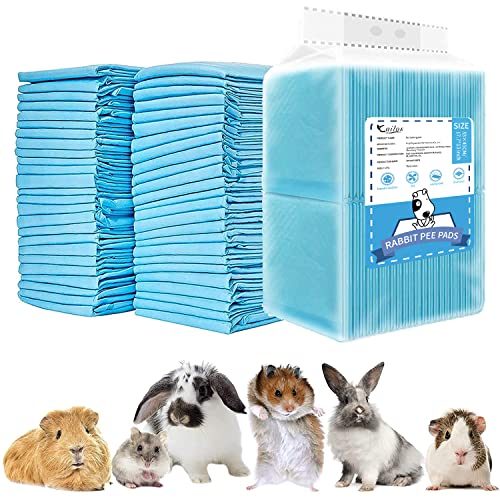If you find yourself in a position of discovering/rescuing a nest of wild baby rabbits, the following might help you.
Mother rabbits don't stay on the nest as it would be a giveaway to predators. The chances are very good that mom's nearby and waiting for the babies to return.It is highly advised to return them immediately to the nest.Don't worry about having handled them. The doe will still feed and take care of them.
Does usually feed their babies once a day, at dawn. Sometimes they feed them twice, but you can be certain that early in the morning, is when the babies have to be in their nest to get their mother�s feeding. If you are concerned that other pets or animals can get at the babies in the current nest they were in, another idea is to put a screen over the nest, but make sure it�s removed for the 5:00 a.m. or early morning feeding. A doe won�t move her babies to another location.
If the babies' eyes are open and they're hopping around, the mother is probably long gone. If they are very young and their eyes are still closed, the best thing to do is return them to the nest immediately or contact a wildlife rehabilitator in your area. At around 10-12 days, they start munching on grass and once they are hopping around and eating, they may be released
If the wildlife rehabilitator isn't available when you discover a baby wild rabbit and you can't find the nest, keep the baby warm as they can quickly get a chill, and you can try giving it Kitten Supplement (KMR), evaporated milk, goat's milk or whole milkuntil the rehabilitator returns to the office. You can feed them with an eye dropper but you have to be very careful and do it slowly as you can easily get liquid into their lungs if not careful and cause their death. One must be very precise in getting the dosage correct for the babies.Overfeeding them can kill them.
As Pamnock once said, if you are pregnant, handling them with gloves or washing your hands really well after handling is a must. If the babies begin to stress and become ill, they quickly propagate harmful bacteria in their bellies including E. coli. Children may pet them, but be sure they wash their hands afterwards. The most likely transmission of any disease is through bite or scratch wounds, as well as fecal material or urine.
A wildlife rehabber once noted that if they were released and ran off, that was great. However, if they are released and they are too scared to leave the cage or didn't run away, they were probably too scared to go and you should bring them to a wildlife rescue for them to help get the little one acclimated back into the wild.
Remember: It is extremely difficult to raise a wild rabbit by yourself, the success rates are extremely low for them living in captivity. In many areas in the United States, it is illegal to keep a wild animal.
Websites to look into:[url]http://www.2ndchance.info/bunnies.htm[/url] orhttp://www.wildliferescueleague.org/report/nova_rabbit.html orhttp://www.rabbit.org/faq/
-Carolyn
Mother rabbits don't stay on the nest as it would be a giveaway to predators. The chances are very good that mom's nearby and waiting for the babies to return.It is highly advised to return them immediately to the nest.Don't worry about having handled them. The doe will still feed and take care of them.
Does usually feed their babies once a day, at dawn. Sometimes they feed them twice, but you can be certain that early in the morning, is when the babies have to be in their nest to get their mother�s feeding. If you are concerned that other pets or animals can get at the babies in the current nest they were in, another idea is to put a screen over the nest, but make sure it�s removed for the 5:00 a.m. or early morning feeding. A doe won�t move her babies to another location.
If the babies' eyes are open and they're hopping around, the mother is probably long gone. If they are very young and their eyes are still closed, the best thing to do is return them to the nest immediately or contact a wildlife rehabilitator in your area. At around 10-12 days, they start munching on grass and once they are hopping around and eating, they may be released
If the wildlife rehabilitator isn't available when you discover a baby wild rabbit and you can't find the nest, keep the baby warm as they can quickly get a chill, and you can try giving it Kitten Supplement (KMR), evaporated milk, goat's milk or whole milkuntil the rehabilitator returns to the office. You can feed them with an eye dropper but you have to be very careful and do it slowly as you can easily get liquid into their lungs if not careful and cause their death. One must be very precise in getting the dosage correct for the babies.Overfeeding them can kill them.
As Pamnock once said, if you are pregnant, handling them with gloves or washing your hands really well after handling is a must. If the babies begin to stress and become ill, they quickly propagate harmful bacteria in their bellies including E. coli. Children may pet them, but be sure they wash their hands afterwards. The most likely transmission of any disease is through bite or scratch wounds, as well as fecal material or urine.
A wildlife rehabber once noted that if they were released and ran off, that was great. However, if they are released and they are too scared to leave the cage or didn't run away, they were probably too scared to go and you should bring them to a wildlife rescue for them to help get the little one acclimated back into the wild.
Remember: It is extremely difficult to raise a wild rabbit by yourself, the success rates are extremely low for them living in captivity. In many areas in the United States, it is illegal to keep a wild animal.
Websites to look into:[url]http://www.2ndchance.info/bunnies.htm[/url] orhttp://www.wildliferescueleague.org/report/nova_rabbit.html orhttp://www.rabbit.org/faq/
-Carolyn






































































